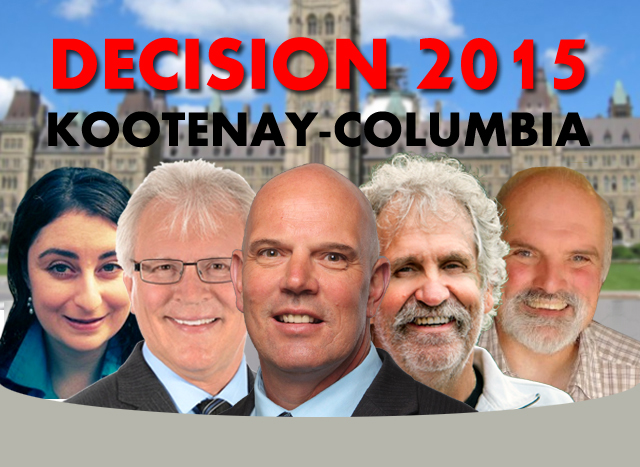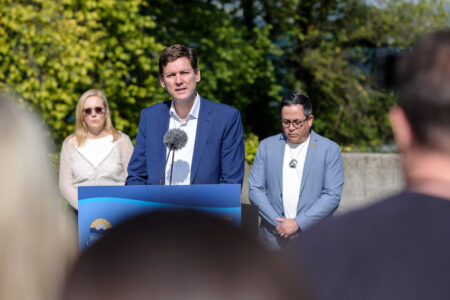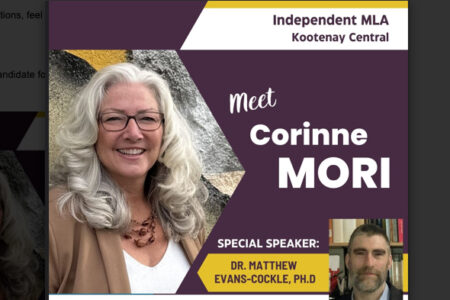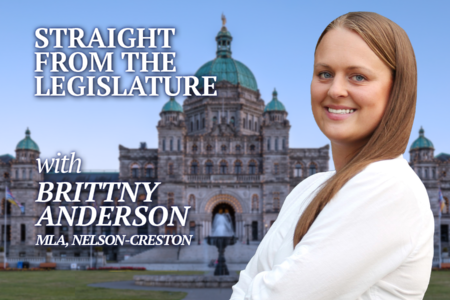The Nelson Daily Question of the Week — Economy
On Monday, October 19, voters in Kootenay-Columbia riding will go to the polls to elect the MP for the region during the 42nd Canadian General Election.
The boundaries, and issues, have changed in the Kootenay Columbia riding, where four candidates — Bill Green of the Green Party, Liberal candidate Don Johnston, Wayne Stetski of the NDP and Christina Yahn of the Libertarian Party — are trying to unseat incumbent David Wilks of the ruling Conservative Party.
To help voters in the Kootenay/Columbia riding make their decision, The Nelson Daily is sending out weekly questions to quiz the candidates on pressing issues during the campaign.
Question two deals with the Economy.
As per the recent The Nelson Daily poll, along with many others throughout the country, the economy is being pegged as the number one issue in this campaign. Do you feel this is the most important issue, and why?
Don Johnston, Liberal Party of Canada
The economy is the major concern but how we govern is the key issue. The 2008 recession lasted less than one year but economic and job growth has been dismal for six. When young people are stuck chasing temporary jobs, families get taxed on government benefits, and seniors have to wait until they’re 67 to receive OAS it’s a symptom of a stagnant and poorly managed economy. These concerns get magnified in a rural area like the Kootenays.
Economist Helmet Pastrick pointed out that level growth in the Kootenays proves how we are not taking advantage of certain economic sectors and the closure of the Canal Flats lumber mill shows how lifetime jobs are disappearing. We need to reinvent our rural economy.
The Nelson Development Partnership and others provide great data on current conditions but Stats Canada staffing reductions and Harper’s decision to get rid of the long form census make local planning more difficult. That has to change.
OECD, or CIBC job quality analysis prove this record of mismanagement reflects more than global downturns. A government that leads dialogue with all sectors and generations and has processes to offer consistent support and stimulus to our riding is essential.
Bill Green, Green Party of Canada
The economy, jobs and climate change are the number one issue in Kootenay-Columbia. They are deeply interconnected.
As I travel the riding, many people are telling me the economy and the need for family-supporting jobs are their main concerns. That’s where climate change comes in.
Canada is at a critical crossroads. We urgently need to begin the transition to a new economy based on clean, renewable energy sources. The very real impacts of climate change mean we can no longer afford to hang our hats on a fossil fuel economy.
Reducing carbon emissions by moving away from fossil fuel dependency requires incentives to industry. Green Party policies will create strong, predictable incentives for industry to reduce investment in fossil fuels while significantly increasing investment in the renewable energy sector. We can also carefully use some of Canada’s fossil fuel resources to finance the transition.
Building the economy of the future also requires national investment in skills training, education, energy efficiency and development of renewable energy technologies.
Can you provide numbers for how the Kootenay Columbia riding is doing economically?
What indicators are you using to provide those numbers?
Providing an economic snapshot of Kootenay-Columbia is difficult because the riding does not fall neatly into any region typically used for economic analysis.
Statistics Canada, BC Stats, Columbia Basin Rural Development Institute and Columbia Basin Trust include part or all of the riding in their reports but these various regional profiles also include areas outside the riding.
Nonetheless, here are some indicators from a variety of sources.
They present a complex, sometimes contradictory, picture.
- Economic development was the number one priority for Columbia Basin residents in 2014-15.
- Kootenay unemployment rate in August 2015: 9.4% (BC 6%).
- Kootenay Development Region saw the most job growth of all BC regions in 2014.
- The trade sector had the greatest job growth in Kootenay Development Region 2013 over 2012.
- Median hourly wages in Kootenay Development Region fell by 11% in 2013 over 2012.
- 44% of Basin-Boundary businesses surveyed in 2014 reported difficulty recruiting for job openings.
- Only 15% of residents surveyed in Basin-Boundary in 2014 said there are sufficient job opportunities in their community, while 90% said they can’t find a suitable affordable home.
- All Basin-Boundary communities had higher hotel room revenue in 2014, highest rate of increase was in Revelstoke at 14%.
Wayne Stetski, New Democratic Party
I’ve spoken to people across the riding, and I’ve knocked on more than 1000 doors, and the number one thing people say to me is that it is time for Stephen Harper to go. When I ask them why they feel that way, their answers range from the muzzling of scientists to the imposition of Bill C51. But they also talk about the economy. Not just the national economy, but their personal economy.
Statistic Canada’s Unemployment Rate for the Kootenays shows that the unemployment rate is up significantly: 6.4% in August 2014, 9.4% in August of 2015. Clearly, the Harper Conservatives are failing the people of Kootenay Columbia when it comes to job creation and managing the economy.
Canadians are working harder than ever, but many can’t seem to get ahead. Incomes are dropping and household debt is rising. And many of the jobs that have been created are part-time, with no benefits or pension plan.
And NDP government will focus on improving the local economy, as well as personal economies, in the Kootenays. We have a plan to:
- Help local businesses grow by cutting the small business tax rate from 11% to 9%. Small business generates 80% of the jobs in Canada.
- Work with towns and cities to build new roads, bridges and community infrastructure.
- Kick-start manufacturing with a new Innovation Tax Credit.
- Begin the transition towards a green economy. Investing in renewable energy including solar, thermal, micro-hydro, bio and wind energy builds jobs right here in our communities. New local jobs so you don’t have to travel to Northeast BC or Northern Alberta to find work.
- Increase funding for Apprenticeships and Co-op placements for youth.
- Ensure our forest sector remains innovative and competitive by investing in forest product manufacturing, supporting forestry research and development and expanding promotion of Canadian wood products to new markets.
I am also committed to convening a series of meetings that will bring together small businesses with Federal, Provincial and Local government leaders from around the Kootenays to have a serious conversation about how the three levels of government can work together with local businesses to help them succeed.
It will take all of us working together collaboratively to ensure we have more, and better, jobs right here at home in the Kootenays.
David Wilks, Conservative Party of Canada
The economy is our number one priority, that’s why we have a low-tax, balanced budget plan to protect our fragile economy. Amid global economic turmoil, your choice has real consequences. The wrong government decision on taxes, spending or deficits can upset our fragile economy, causing business closures, downsizing and job loss in your community.
With a $5 billion surplus so far this year we’re pursuing a low-tax, balanced budget plan to protect Canadian jobs and growth in the face of global uncertainty.
The Liberals announced they will run multibillion deficits. They will also raise taxes to pay for their promises. The NDP is promising billions in new spending with no plan to pay for it. Taxes will have to go up. Neither is able to manage the Canadian economy in the face of global turmoil. You, your family and your community will feel the consequences.
The ballot question is simple. Which party is best to manage and protect the fragile Canadian economy – and your job – in the face of global economic turmoil?
We are asking people to protect our fragile economy on October 19th. Only a Conservative government can protect our fragile economy for the next four years.
Christina Yahn of the Libertarian Party declined the invitation to respond to The Nelson Daily Question of the Week.
First Question — Climate Change.

























